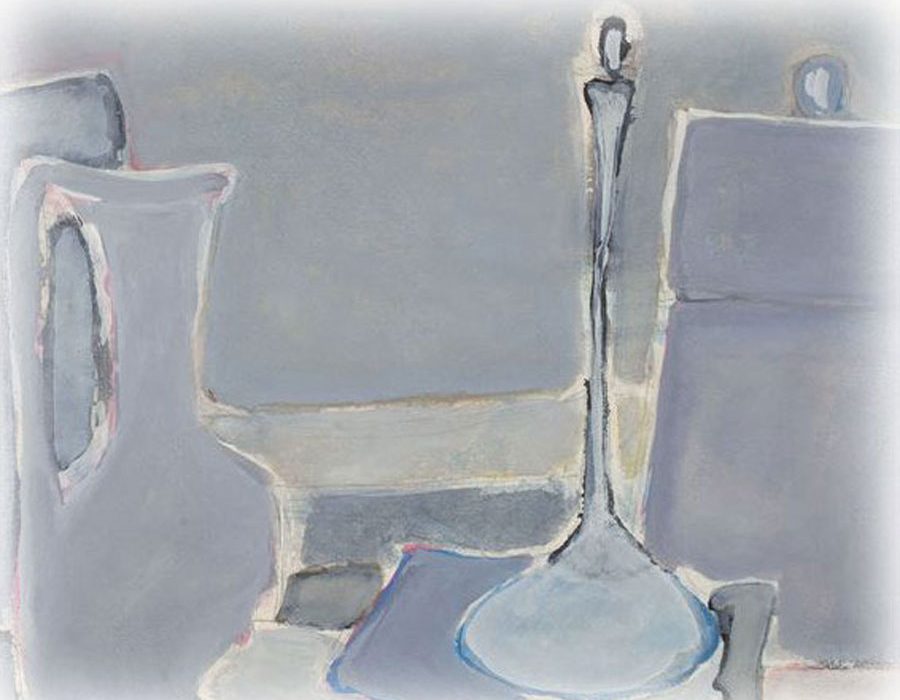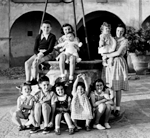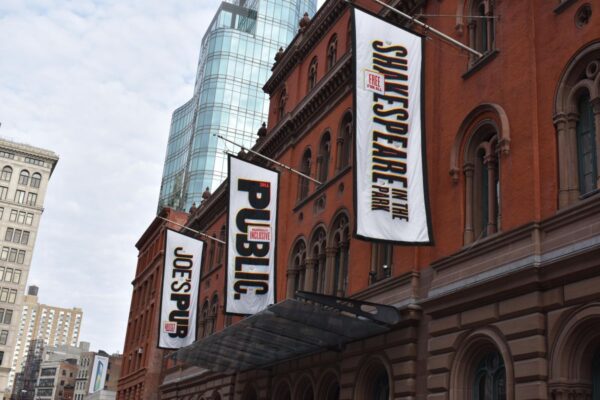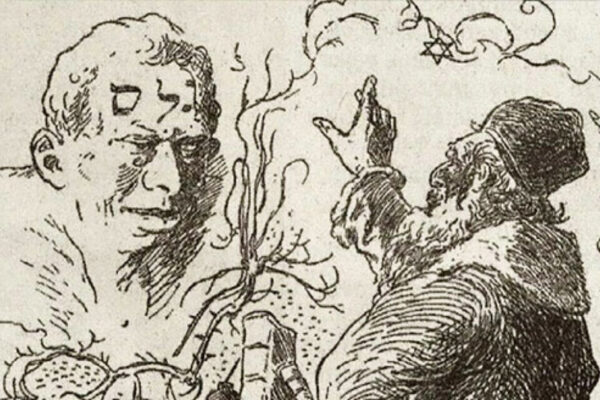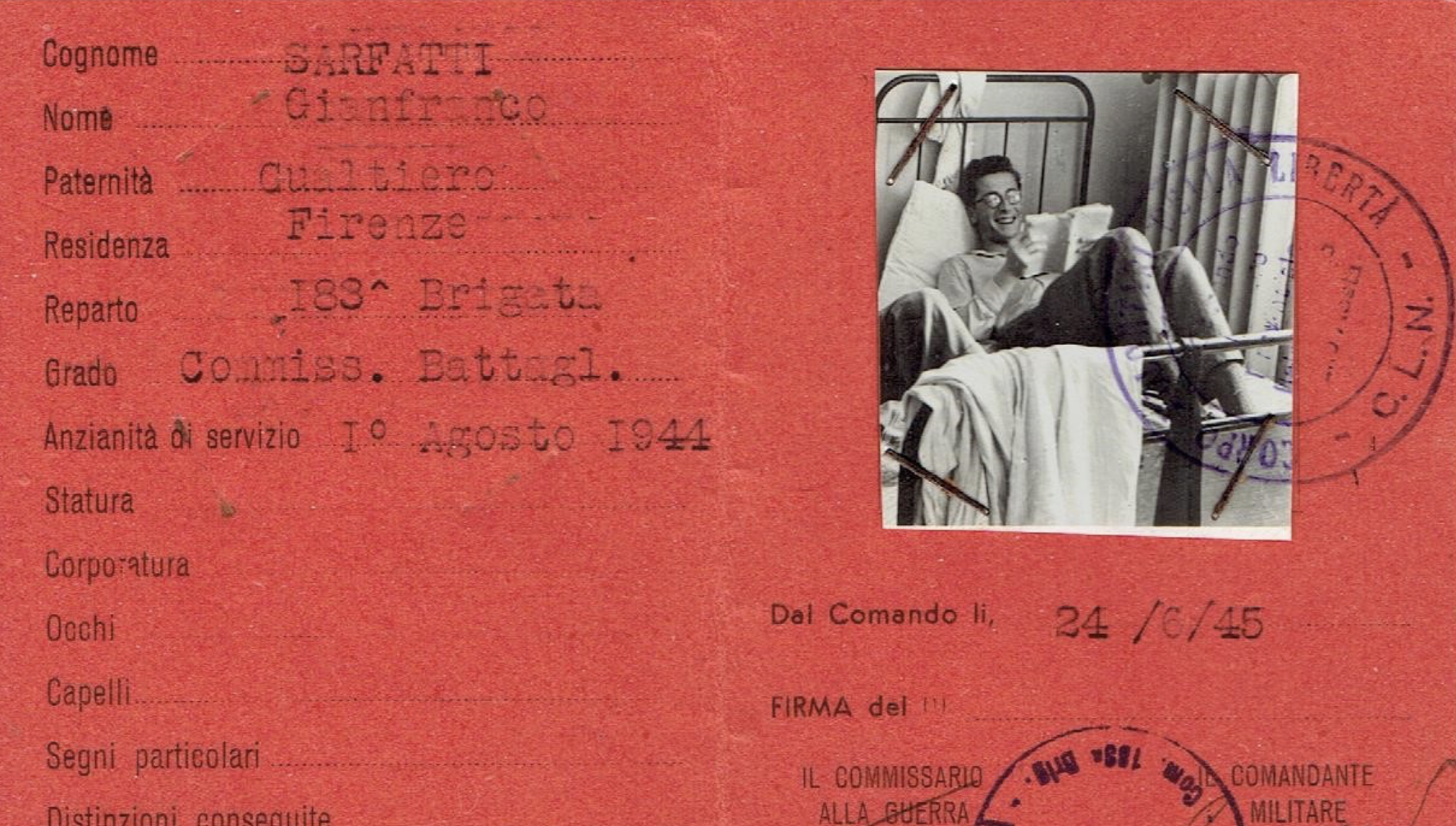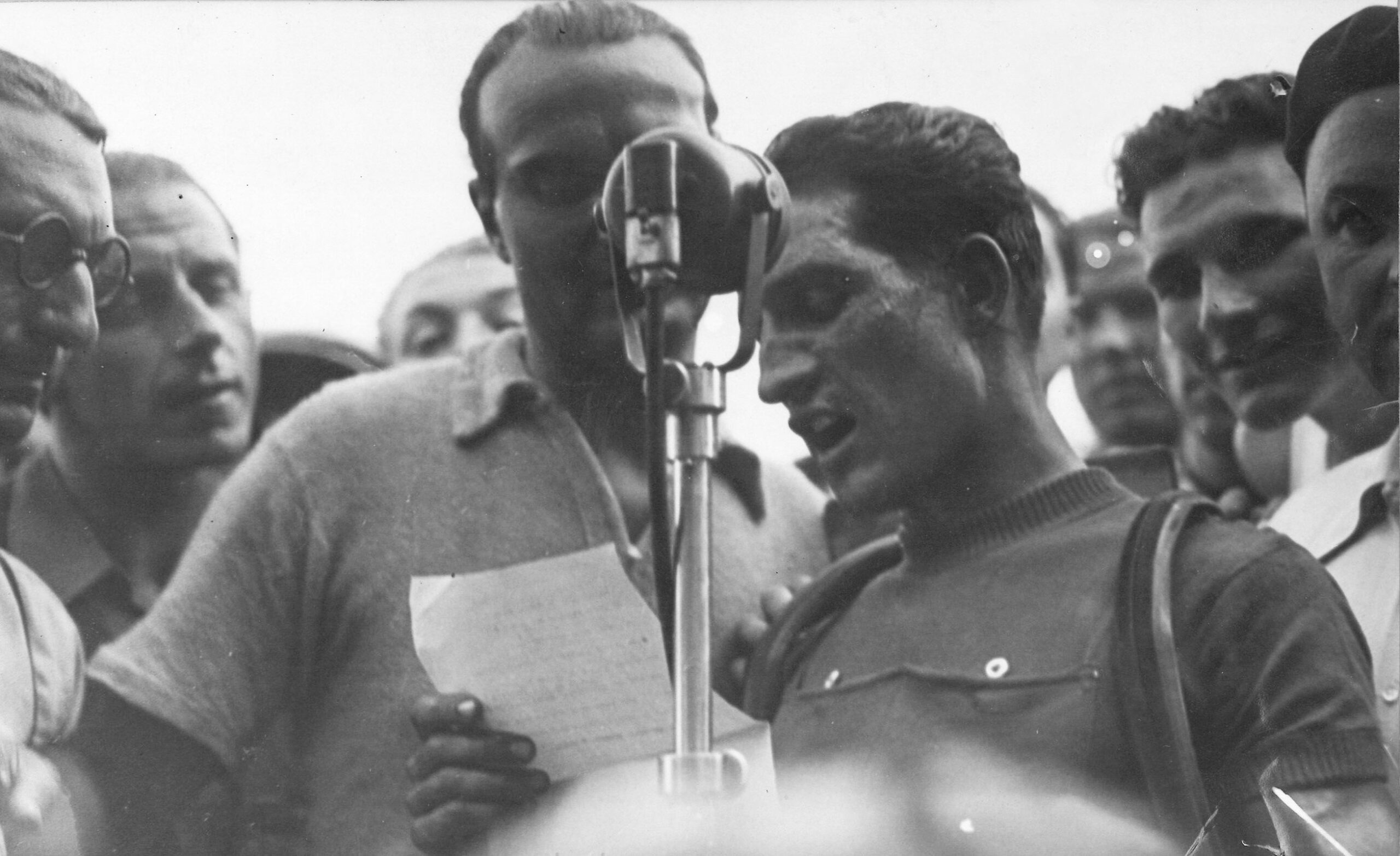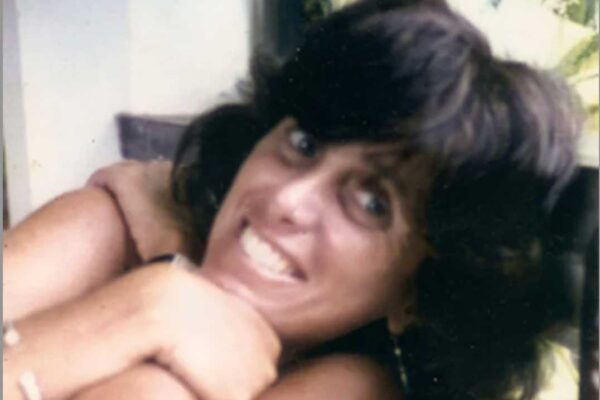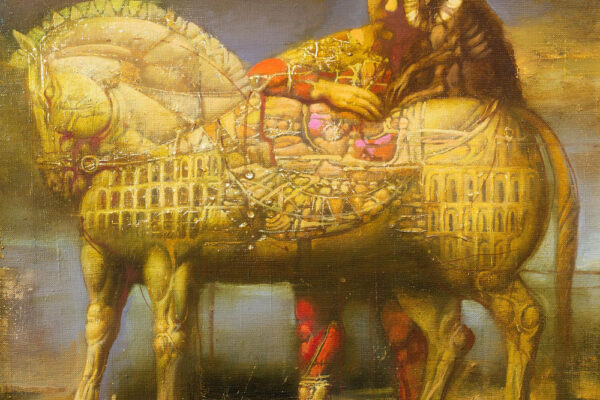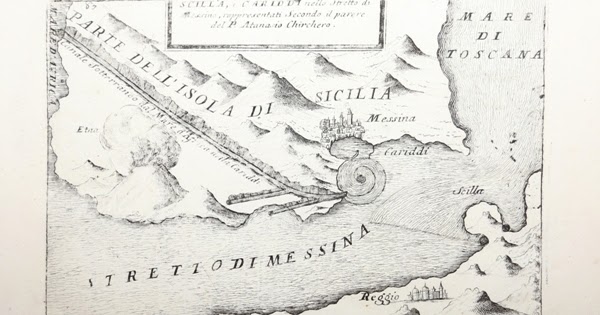A recollection of artist Piero Cividalli published by La Giuntina, Florence on the occasion of the publication of his father’s memoir “From Dream to Reality: Letters to My Combat Children: Palestine 1947-48” (Gualtiero Cividalli, La Giuntina, 2005). Read Italian version. English translation by Inga Pierson.
A prosperous Italian Jewish family, antifascist and friends of the Rosselli brothers decides – when faced with the racial laws, to emigrate to Israel. This is the story of a son of Florence and his tumultuous life: a carefree childhood in Tuscany, a difficult adolescence in Palestine, a return to Europe with the Jewish Brigades in 1945, participation in the 1948 War and in the ones that followed. He tells a story of Zionist ideals and illusions, and the indelible memory of combat.
Piero Cividalli (Florence, 1926) lives in Ramat Gan, Israel. He is a retired art history and drawing teacher and a painter.
We were members of the Florentine bourgeoisie, affluent like many others. My father was an excellent engineer and he shared an office with the architect Ugo Giovannozzi. My grandfather Carlo was a top executive with the Italian railways and my grandmother Gilda Contini was from Ferrara. My uncle Giorgio, my father’s brother, was also an engineer who specialized in the railways. My maternal grandparents, Giuseppe D’Ancona and Alice Orvieto, were landowners and my grandfather, a well-respected agronomist, was also a consultant to various patrician properties around Tuscany. Giuseppe, in turn, was the son of the philologist and literary historian Alessandro D’Ancona. We had many good friends, but the Rosselli brothers were among the closest and dearest to us. My mother Maria has been a classmate of Nello’s at the Liceo Classico Michelangelo in Florence. Together with Nello, my father Gualtiero, who was a year ahead of them in school, had founded a monthly magazine – Noi Giovani [We, the Youth]. First published toward the end of 1916, it was patriotic, literary and interventionist – they intended to inspire their contemporaries to an intellectual and moral participation in the war efforts. They printed the paper at the Rosselli’s house, producing six editions in all, until June 1917 when my father left for the front. Along with my father’s articles and those of a few other classmates, that little high school newspaper contained Carlo and Nello’s first literary exercises.
My father was stationed along the Piave and in Vittorio Veneto. A lieutenant, he commanded of a special division of telegraphers charged with maintaining the telephone wires between units on the front lines. After the war he became a militant anti-fascist. He was miraculously spared on a bloody evening in 1925 between October 3rd and 4th when Consolo and Pilati were assassinated by a band of fascists (the authorities being complicit). The gang came looking for him too but by chance and most fortunately, he was with his mother in the country – at her family’s chateau in Volognano, near Rignano sull’Arno. Following that incident and for his family’s sake, he withdrew from militant activism but he remained a committed anti-fascist. He managed to receive his engineering qualifications in 1926 without becoming a member of the Fascist party.
The assassination of the Rosselli brothers in 1937 was a terrible tragedy for us. It was a crucial moment in our lives because, as I’ve said, our families were very close. Our parents often went out together in the evening – I remember them telling us about taking a drive to ‘Apparita’, the Rosselli’s villa in Bagno a Ripoli, or to dinner at Nello and Maria’s in town. We often vacationed together and even among us children – Nello’s children and ourselves – there was an intense bond. We spent many hours in their yard on via Giusti and they often came to our house as well. They were truly our closest friends in those years.
I have especially vivid memories of a vacation with them and our three Salmon cousins in Dobbiaco (Trentino Alto-Adige) in the summer of 1936. The news that Nello and his brother Carlo had been killed in France – only a year later, in June of 1937 – was a wake-up call for us. We realized that everything was changing and that life as we knew it was soon to be altered forever. Ever since Hitler’s rise to power in 1933, we knew that European and especially German Jews were facing serious difficulties. Then there were the refugees arriving from Germany (which, after the annexation of Austria in March 1938, bordered Italy directly). My father tried to assist as many of them as he could, mostly by helping them to leave Italy for somewhere more secure. But in the fall of 1938, the racial laws turned our lives upside down. We were expelled from school.
I remember that my father called a meeting in our house in Florence to tell us that we could no longer go to school and that we would have to study privately. In the meantime, the Florentine Jewish community improvised a school system of its own, run by Jewish teachers who had been forced to abandon their jobs. Not long after, father informed us that we would have to leave Italy. We went first to Switzerland and from there, after the necessary documents and permits of stay had been procured, we came to what was then Palestine. (At that time, it was still a British colony.)
My father was a Zionist and a follower of rabbi Alfonso Pacifici, a lawyer with a strong personality who had led the Zionist movement in Florence in the 1920s. My father remained close to him throughout his life. When Father spoke to us children about Israel, he described a far away and foreign land but one that was somehow also dear to his heart. The Keren Ka Yemet, a fundraising organization that helped Jews purchase property in Palestine, had office space in our house in Via Andrea del Castagno. I remember the fundraising drives and the jars to collect bills. In other words, we were familiar with Zionism, we just didn’t really know what it all meant.
Towards the end of 1938 when my father decided to come to Israel, he didn’t have the famous certificate that allowed one to emigrate to Palestine. However unwilling to leave us in Italy lest we be separated forever, he brought the entire family to Switzerland. From there, in early January 1939 he left for Palestine on a tourist visa. Once he had obtained visas from the English authorities, he instructed my mother to return to Florence to pack our things. So she did and we left for Palestine right after. Our departure was traumatic: leaving the house, our housekeeper’s sobbing, my grandparents’ laments, the pain of saying goodbye to so many relatives. The atmosphere of grief which pervaded our last days is very difficult to describe. There was this feeling that something very grave and serious was happening and we were much relieved once we boarded the ship.
We departed from the port at Venice in March 1939. The ship was called the “Marco Polo” and if I remember well, it stopped in Bari, Rodi, Alexandria in Egypt and finally at Haifa. The voyage took about a week. Our cook and governess, Antoniettia Calamai, made the journey with us. A gentile, she was very faithful and dear to us; we called her ‘Tetta’ and her help was essential to my mother who was otherwise alone with five children. Lia had been born only a few months earlier, during our summer vacation at Cortina d’Ampezzo, Gabriel was merely three while Paola, Bona and I were already school-aged.
What was the cause of our departure? The racial laws or my father’s Zionism? I think I can say both because Zionism was evidently alive and well in my father’s heart but, since he had spent his life in Florence and his work was there, I don’t think he would have come to Israel if it hadn’t been for the racial laws. The injustice of these measures forced him to look for a way out, to be able to live free and in a safer and more hospitable place. My father was doubly in danger since, in addition to being Jewish, he had also been an anti-fascist activist in his youth.
After a week or so in Tel Aviv, my father found a house not to far from the beach and large enough to accommodate our big family. It was on Allenby Road, at that time, the main avenue in a large neighborhood. Our furniture arrived from Florence and we moved in. We were already in school and so we had to wait for the summer break before returning to Tuscany – in May 1939 – to visit our grandparents in the country. Both sets of grandparents had remained in Florence. We left Palestine with Tetta.
In August I fell ill with scarlet fever. The war broke out during my illness; I was in isolation in Casentino in my aunt Lina Anau’s home – Villa di Nassa. My mother had wanted to leave immediately for Palestine but she had to wait until I was well enough to travel. In any case, initially travel between Italy and Palestine had been suspended but soon enough the ships were re-instated. With the war looming and perhaps persuaded by my Uncle Giorgio, my Cividalli grandparents decided to emigrate as well. Unfortunately Tetta was not able to come with us this time – since she wasn’t Jewish she could not obtain permission to leave the country. And so finally, together with our paternal grandparents, we left from the port at Trieste on a ship bound for Palestine.
My mother’s family, the D’Ancona clan, decided not to emigrate. I never really understood why. My uncle Alessandro (D’Ancona) was married to a Swiss gentile, Charlotte Durgnat, and perhaps he thought he was less at risk. Moreover he was a landowner without a profession per se and I suspect he had no idea what he might do far away from his estate in Pontedera. It was the same for my Aunt Clara and her husband Elio Shalom. Apparently traditions and attachments were strong enough to keep them all in Tuscany. Grandfather Giuseppe was elderly and ailing and, at that time, no one could have imagined that it would have been such a tragedy for the Jews. The Italy of 1943 was inconceivable then.
Meanwhile, assimilation in Palestine was difficult – it was another world altogether and the habits and customs were so different from our own. Compared with our native Italy, Palestine seemed a foreign and even primitive place. It wasn’t easy for my father to find work. At school I, at least, had a hard time acclimating. I knew some Hebrew since we had always had lessons, even in Florence. I knew the alphabet and I could read all the letters very well, I just didn’t know what they meant. So I could read but I couldn’t understand anything. I didn’t really have any friends and the only other children I could speak with were German. Like our family, many German families emigrated to Palestine in the late 1930s and those children didn’t know Hebrew either.
I had learned some German when I was very little with a German au pair who stayed with us in the early 1930s. She was the much beloved ‘Ina’ (the diminutive of ‘signorina’ or ‘miss’) and she remained a close friend throughout that decade. Her name was Maria Marschall and she came from noble Austro-German stock. She had even come with us to Switzerland, smuggling our jewels and money since, as Jews, we had been forbidden to carry or transport anything of value. She remained with us for the duration of our stay in Switzerland and left us only when we returned to Florence to prepare for our journey to Palestine. We know that later she was hosted by the marquises Paulucci de Calboli di Forlì, who were eventually shot by the Nazis – for their anti-fascist sympathies and activities.
In Tel Aviv we focused on our studies. We took private lessons and it was then that I discovered painting. I also took drawing lessons from Renzo Luisada. My father, seeing my passion, was very supportive and he worked to find me the best of teachers. But I also took lessons in Italian literature and in other subjects not offered in the local schools. Otherwise, life was conditioned by the course of the war.
When Tel Aviv was bombed by the Italian army, my grandparents’ house was hit. They had to flee to our house in the middle of the night. My father found them another apartment on the same floor of our building and it was as if we all lived together.
Our apartments were adjacent and we shared a balcony. Nearby there were also my father’s sister Jolanda, her husband Mario Bolaffio and their three children. We were quite a crew and our house was a kind of “port” – we were constantly receiving visitors and new arrivals from Italy.
My mother gave everyone a generous welcome and helped one and all to the best of her abilities. Life was very busy and, despite our distance from Europe, the war was very much a feature of daily life. In the evenings, I remember people gathered at our house to listen to the radio. At the same time, the Germans were making their way across the Middle East and this produced a great deal of anxiety within the community. A few even spoke of suicide if the Germans were ever to arrive. But the defeat at El Alamein put our fears to rest.
The Arabs? Even then, they were already quite discontented. They did not look kindly upon the new Jewish settlements and they made their displeasure quite clear. For example, back then between Tel Aviv and Ramat Gan – where my sisters Bona and Lia and I all live today – there were many large parcels of land, free and open, and just a few scattered Arab villages. But after the 6PM curfew, travel between Tel Aviv and Ramat Gan was forbidden. Nobody could move. The curfew was dictated and enforced by the English. Sometimes there were general daytime curfews too but only when the English wanted to sequester Jewish weapons. If there was an incident, the curfew might last 2 or 3 days. We sometimes went to Jaffa but always warily and with great caution since we knew we were not wanted there. I don’t really have any memories of the market in Jaffa, we’d pop in and get our errands done as quickly as possible.
And so it was that we grew up with an understanding of the human world, of war and of the plight of the Jewish people. Maybe we knew more than they did in Europe but we had news of the Nazi atrocities and the concentration camps and we were compelled by our knowledge to combat the forces of evil. My eldest sister Paola enlisted in the English army in 1943 and they sent her to Egypt. I was too young to join her but early in 1945, once I had turned 18, I enlisted as well. We didn’t realize then that the war was almost over. The Jewish Brigade fought on the front lines between Florence and Bologna and I longed to join them and to help push the Germans out of Italy. I wanted to do my duty as a man and as a Jew and also to help the relatives I had left behind in Tuscany.
But as a soldier, I returned to a ruined, miserable country and, as happy as I was to see my grandparents, cousins and friends, the devastation made my homecoming bittersweet. Everyone was safe – some had weathered the worst of it in Switzerland and others had been safely hidden in convents. My D’Ancona relatives had taken refuge in a rustic farmhouse on their property and had been protected by loyal peasants. My uncle Giorgio Cividalli, his wife Vanda and their daughters Miriam, Carla and Anna, had escaped to Switzerland. My aunt Vanda Bonfigli was very ill. I saw her for the last time in 1946, at the hospital in Bologna.
Almost immediately however, I was sent to Austria and from there to Belgium and the Netherlands. I could go to Italy on furlough and that was it. I remember a strange experience connected with one such visit. I arrived in Novara and, looking for a way to get to Florence, I had begun to inquire into transportation options in Italian. Since we had always spoken Italian at home, it was very normal for me.
Sounding like a native but dressed as a British soldier however, made me suspect to a group of Italian army men on the train. They thought I was a spy. I was afraid and in order to protect myself, I deliberately faked a foreign accent and changed cars. In the summer of 1946, I was demobilized and returned to Palestine via Egypt.
I didn’t yet have any professional training and so I started working in a graphic design studio. But that didn’t last long. In 1947, my sister Bona and I decided to take a very long vacation in Italy. We left from Haifa, bound for Naples and we spent three months with our grandparents at Volognano and with the Rossellis who vacationed close by at their villa in Bagno a Ripoli. We returned to Palestine just in time for the United Nations resolution that divided the territory into two States. The Arab insurrections began at once. It was November 1947.
Volunteers were solicited once again and there was a special need for those young men and women with some military experience. (Israel did not yet exist as a state and so we were all volunteers at first.) I reported for duty immediately and on the first of February, I started training in the Haganà – the Israeli army. I was active duty through January of 1950 and so I fought in all the wars for independence. The worst, especially in terms of battles and sacrifices, was the war of 1948.
That May I fought with the Giv’ati Company in the southern theater in the famous battle for the Negba kibbutz. I was even wounded, but not badly. I was taken away from the line of fire but I remained in the trenches because we were surrounded on all sides.
Then came the first armistices: one in June that lasted a month (from June 11 – July 8) and another between July 19th and October 15th. Between the two treaties, I fought in the second battle for the Negba kibbutz. I learned later that this had been a pivotal battle.
We fought alongside at least 100 kibbutzim who were defending their homes. Following my service on the front lines, I re-enlisted as a medic. In the meantime, the divisions had been re-organized to compensate for all the losses incurred and I was re-assigned to the northern theater.
I remained there, near Galilee, throughout much of 1949 without seeing any action. I was already operating as a medic in the valley of the Jordan, to the south of Tiberias. Then I was sent to Afula, another area of Galilee where I remained for several months.
I was no longer in the Jewish division but with a company of Druze soldiers who had been integrated into our army. We had almost nothing to do with the Arabs save for a few brief and precarious truces.
During the peace, I’d go to Nazareth which was all Arab. I’d roam the streets, eating and meeting people but I had no personal contacts or friends. From that time, I don’t remember anything of much consequence – they had their lives and we had ours.
You’ve asked me about those letters from my father where he tries to comfort me in my distress over certain combat experiences. Alas, these are the ways of our world. I have always been something of an idealist and it has always been my desire to improve things, humanity, society, etc. I had a lot of faith in the Jewish people; with all our knowledge of suffering, I hoped that we might be a different kind of people, superior in some way.
My experience in the wars shattered these illusions and I was traumatized by the realization that war is humanity at its worst. In the end, I found myself participating in activities and authoring actions that went against my deepest convictions and beliefs and which, in my idealist views, were beneath the Jewish people.
May 15, 1948. I remember it well because we were waiting for Ben Gurion to make the official declaration, “Today the State of Israel is born!” We were also prepared for heavy gunfire. That day I was serving with Giv’ati Company and we were near the Gheser kibbutz, a few kilometers from Ramla. The command informed us that we would be sent on a special assignment but initially we were not told what it was. In actuality, they wanted us to conquer a hill where there was a small Arab village called Abushusha.
It was extremely easy to do since almost no one remained in the village – there was only a group of 15 year-old boys. They watched us while we pulled out our shovels and began to dig our trenches. We were eating and smoking and we shared our food and cigarettes with them. We were together all day. In the evening we were ordered to retreat and the officer commanded us to kill the kids. There were 6 or 7 of them; I don’t know the exact number. For me it was a tragedy. Only a few hours earlier we had offered them food and then we shot them, on their knees … I will never forget it.
Yes, our sisters were on the front as well. Bona was in the North near the Lebanese border, with a kibbutz in the Menara mountains. Despite the constant threat of attack, Father and Gabriel managed to spend a week with her in August of 1948. They broke through the line of fire in a supply convoy in order to get to her.
In October when her kibbutz was responsible for prevailing over an Arab offensive, Bona was still there. Meanwhile, Paola was in Jerusalem. My father, who was in charge of the fortifications surrounding Tel Aviv, wrote three copies of the same letter in order to keep us informed and up to date on the course of the war. Being in the capital and near the central command, he was better informed than we were in our outposts.
Gaby and Lia were far too young to enlist and so they remained at home. Paola lived through the siege of Jerusalem and she fought to liberate the city. After the siege ended, she enjoyed some well-deserved R&R in a military camp not too far from our house in Tel Aviv. But even earlier during the June and July truces, she had been able to visit the family at home. I also fought in the later wars, the war of 1956 and the Six-Day War.
In ’56 I was still a medic but I didn’t see combat. I remained in the field hospitals, attending to the wounded. In the Yom Kippur War (The Arab-Israeli War of 1973), I was in my element, in a company that specialized in camouflage. We were in the desert, near Negev … I remember days spent in the scorching sun; we would lie under our tanks and trucks just to get some relief and a little shade. And the nights were as cold as the days were hot.
One night I was so cold that I tried to cover myself with sticks and branches. In 1974, they enlisted me but I wasn’t called up because I had back problems. I served but I was no longer fit for the battlefield and that year I was finally discharged for my advancing age. I never had any rank. I had one when I was a soldier in 1948 but they took it away when I re-enlisted as a medic (in the reserves) because I hadn’t held it for long enough. At that time things were very confused and the question of rank hadn’t yet been clearly defined – what was important was to have an assignment. If you had an assignment, you had a duty to fulfill and the rank didn’t matter.
We had to go to a lot of trouble to get our Italian citizenship back. I was the first, thanks to my dear friend Gualtiero Procaccia, a lawyer from Florence who was also an émigré to Tel Aviv. We had been successful because knew the officials at the Italian embassy. By the 60s I was already traveling with an Italian passport that bore my name and that of my oldest child. My wife Shura, by whom I had two children – Amos and Roy, born in Palestine – also had an Italian passport.
Even so, when Bona tried to reclaim her citizenship we discovered that during the war the English had taken my father’s passport (even though he had not renounced his citizenship). This meant that we children lost our citizenship as well. My parents had theirs reinstated when they bought a house in Florence but the government didn’t want to recognize the rights of us children.
To the day he died, my father even received a small pension from the Italian government for his service in the Great War and he was decorated with a ‘Croce di Ferro al Merito’ [Iron Cross of Merit]. However, when my sister Bona applied for a passport, she was told that she had no right to one.
Likewise, when I went to renew mine, they refused and my children lost their citizenship rights as well. Imagine, in 1984 my son had gone to Europe with both passports (the Israeli and the Italian) and he had been able to work there, and suddenly we were no longer Italian! Bona filed a lawsuit against the Italian government saying that the denial of citizenship constituted an injustice on two grounds: first, my father had never renounced his citizenship and second, even if he had, we, as minors with Italian birth certificates, had never renounced ours.
She won the case but our battle didn’t end there. The embassy in Tel Aviv insisted that the city of Florence had to issue the updated documents certifying citizenship. But for reasons unknown, the registry in Florence refused to update our personal information. We had to call our lawyer, Mr. Manunza, and they capitulated only after he threatened to bring suit.
All this happened between 1994 and 1995 and in ’95 we finally got our passports back.
The Territories? No, I have always been against the occupations, to the extent that, barring necessity, I have always refused to enter the occupied zones. I have only been in such places when commanded by the army or when traveling with others. I didn’t make a stink when a friend asked me to meet up in the old part of Jerusalem – I went, but not happily. I have never willingly gone into the occupied zones – not even in those annexed by Israel -, because I have always thought it better not to go where I wasn’t wanted.


